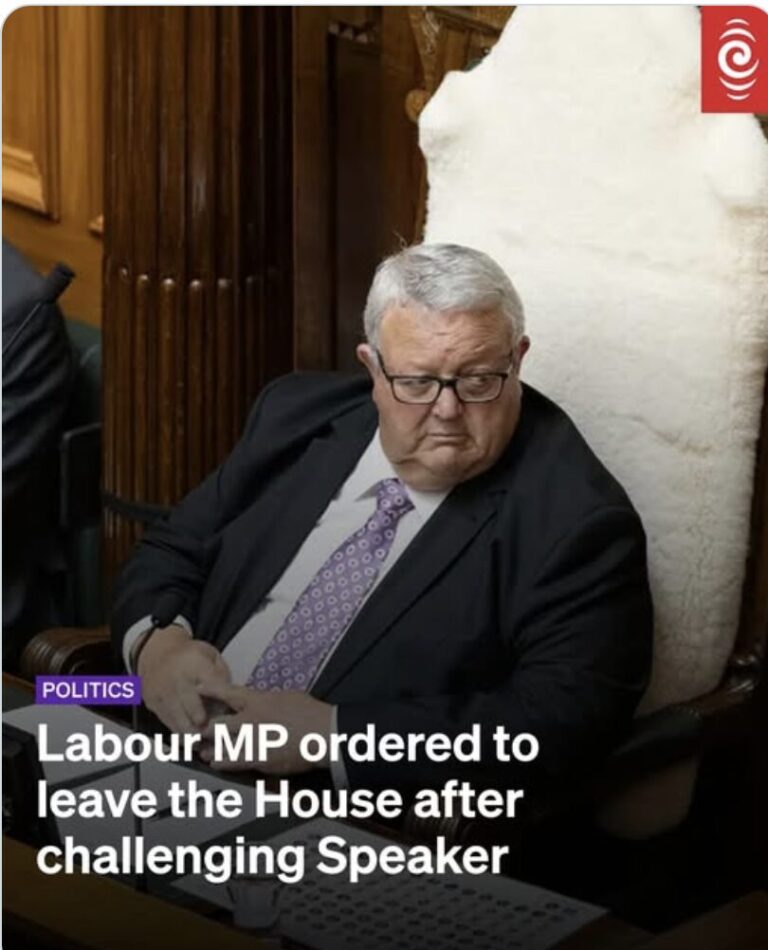GUEST BLOG: Ian Powell – Gender Pay Inequity Perpetuation and Venality
On 6 May the Government ignited a political earthquake with its unexpected blindsiding decision to ram through parliamentary urgency the gutting of the pay equity provisions of the Equal Pay Act 1972. With multi-partisan support the Act had been amended to include these provisions in 2020.
The decision was announced by Workplace Relations Minister Brooke van Velden (also ACT Deputy Leader) under the distorting heading of ‘Changes to Improve Pay Equity Process’: Government justification.
Historical Context
The recent history of pay equity claims had centred on the efforts of the then Service and Food Workers Union (now part of the E tū union, the largest private sector union in Aotearoa New Zealand) whose National Secretary was the strategically focussed John Ryall.

Employment lawyer Peter Cranney researched the then largely forgotten Equal Pay Act
Ryall was acutely aware of the poor remuneration and other conditions of vulnerable largely female workers employed in rest homes. This led to discussions with employment lawyer Peter Cranney in which legal avenues were considered.
Cranney is nothing but rigorous and innovative. He explored the then largely forgotten Equal Pay Act 1972 and discovered a way forward through the courts. Legal action commenced in 2012 centred on aged care worker Kristine Bartlett.
After protracted but successful cases in the courts (including against appeals) a favourable landmark ruling was achieved. National’s Finance Minister and Deputy Prime Minister Bill English accepted that a legal precedent had been established.

Deputy Prime Minister Bill English accepted legal defeats and reached out for a political solution
This led to him making an informal overture to John Ryall in order to find a way forward. English and Ryall were political opposites, but they also shared two characteristics – pragmatism and mutual respect.
It led to the formation of a Joint Working Group on Pay Equity Principles. In 2016 the group provided recommendations to guide the implementation of pay equity, noting that the Equal Pay Act had relied on the courts to determine principles for assessing pay equity issues and setting pay rates.
Equal Pay Amendment Bill
Consequently, the Equal Pay Amendment Bill was introduced in Parliament in September 2018 (the same year in which Kristine Bartlett was awarded Kiwibank’s New Zealander of the Year), passed its third reading in July 2020, and came into force in November.
The 2020 amendment allowed workers to make a pay equity claim using a process aligned with New Zealand’s existing bargaining framework. By making court action a last resort, the approach lowered the bar for workers initiating a pay equity claim.
It meant that employers, workers, and unions would be able to negotiate in good faith, with access to mediation and dispute resolution services available if necessary. Implementation, however, was delayed by the Covid-19 pandemic.
Comparing 2020 with 2025; from a considered process to an unconsidered process
While the pay equity amendment bill in 2020 was enacted by a Labour led coalition government (which included NZ First), it arose out of a process initiated by a National-led government. Consistent with this reality, the National Party also supported the 2020 amendment.
The key point of difference was that the 2020 amendment was based on a considered process whereas its gutting in 2025 was not. The kindest statement that can be made is that it was based on a non-considered or ill-considered process.
Further, it was done within days without any opportunity to make representations. Such rushed parliamentary legislative processes like this are normally reserved for emergency or extreme urgency situations.
There was nothing remotely like these circumstances to justify the ramming through the disempowering pay equity counter-amendment.
Further, in the 2023 election campaign, National did not indicate any interest in repealing the legislation it had strongly supported in 2020.

Brooke van Velden began secretively planning pay equity gutting in November 2020
Soon after becoming Workplace Relations Minister in November 2023, reportedly Brooke van Velden privately advised Prime Minister Christopher Luxon that she was going to look at the pay equity legislation.
But there was no public statement about this until the blindsiding 6 May announcement. It was one of the most secretive political processes ever.
Analysing the pay equity appeal
Much has been rightly said on the undemocratic and duplicitous process in which the gutting of the pay equity occurred. Poor process is a high predictor of a bad outcome. The unjustified retrospective cancelling of a reported 33 live pay equity claims has also been rightly condemned.
But the substantive issue is that the Government, by increasing the threshold for reaching settlements, has ensured that future pay equity claims for somewhere between many to all affected women are much more likely to fail or not even initiated.

Pay equity trailblazer and New Zealander of the Year Kristine Bartlett described the government’s action as a betrayal; “wrenching” and “hurtful”
In other words, rather than improving pay equity as the Government disingenuously asserts, its repeal will perpetuate pay inequity for working women. This is why the legislative gutting is being forcefully described as a betrayal by so many, including Kristine Bartlett.
Business journalist Bernard Hickey summarised it in his email publication TheKākā (8 May) as
Carers, teachers & nurses lost up to $17b, to fund $14b of tax cuts. Pay equity grab wrecks wage rises worth up to $17b over 4 years, paying for $14b of tax cuts for NZ’s wealthiest.

Pope Francis provides words of wisdom
There has been extensive media coverage which has been overwhelmingly unflattering. This includes the following:
- A good introductory backgrounder by Laura Walters in Newsroom (8 May): Locking out future pay equity claims.
- An erudite contextual overview from historian Professor Anne Salmond, with a bit of help from the late Pope Francis, in Newsroom (9 May): She won’t be right mate.
- Veteran NZ Herald political columnist Audrey Young describes it as robbing Paula to pay Paul and a backfiring political ambush (9 May): Ambush will bite National.
- Not to be outdone, veteran Sunday Star Times political columnist discusses the political implications and the increasing risk of election loss (11 May; paywalled): Grotesquely bad politics.
- From a different angle Council of Trade Unions economist Craig Renney raises on Substack many pay equity questions that the Government has yet to answer (9 May): Unanswered questions.
- Otago University senior psychology lecturer Dr Ryan Ward offers, also on Substack, a class perspective in which he argues that the Government’s decision it may be a turning point (9 May): Notes from the class war.
- Finally, Steve Braunias provides humorous insights in Newsroom (9 May): Secret diary of pay equity reforms.

Finance Minister Nicola Willis unconvincing and disingenuous in defence
While Brooke van Velden appears to have gone to ground, at least in the public eye, it has been left to Finance Minister Nicola Willis to provide the most substantive defence of the Government’s actions (12 May in The Post): Unconvincing and disingenuous defence.
Her article is assertive but ignores the significance of raising the threshold for consideration of pay equity claims. She also misrepresents the use of comparators for considering claims.
The canned live pay equity claims
The reported 33 live pay equity claims that were cancelled as a consequence of the rammed through legislation were predominantly across education, health, and the public service.
Many involved non-government organisations that depended on government funding. The gender breakdown in these specific lower paid workforces ranged between 65-99%.
Workers covered by these now deceased claims (some groupings below involve more than one live claim) included:
- Librarians.
- Social service workers.
- Home support and aged-care residential workers.
- Plunket nurses, clinical and administration/clerical.
- Community midwives in primary birthing units.
- Hospice nurses and health care assistants.
- Primary care (general practices) nurses and administration staff.
- Access community nurses.
- Awanui medical laboratories.
- Nurses in residential care.
- Artificial Limb Service.
- Education Ministry and Corrections Department employed psychologists.
- Secondary school teachers (the largest group).
What characterises them over and above being female dominated workforces (although their male colleagues would also benefit had the claims been successful), is that these women worked largely in dispersed small workplaces.
Consequently, apart from secondary teachers, they were less able to organise collectively. This vulnerability meant that they were in absolute or relative terms lower paid.
What this all means
As appalling as this pay equity decision is, it should not be seen in isolation. Rather it is part of a right-wing policy continuum of the Government discriminating against lower paid more vulnerable workers.
This continuum began with the immediate repealing of the Fair Pay Act. This act was designed to enable more dispersed vulnerable workers to have more of a level playing field in order to achieve fair pay and other conditions. This was followed by a minimal increase to the already low Minimum Wage.
Making pay equity difficult to achieve is the most recent (and biggest) step in this cruel policy direction.

Gutting pay equity makes re-election of Luxon’s government more difficult
The electoral difficulties for Luxon’s government are significantly increased given the strength of reactive public reaction to the pay equity decision and the number and vulnerability of those directly affected.
Whether it tips the existing fine balance between his government becoming a one-term government or not remains to be seen. But it will certainly make re-election more difficult than it previously was.
It is both incumbent on and politically appropriate for the opposition parties to commit to repealing this pernicious legislation within the first 100 days should some or all of them form the next government.
Getting to politically venal
Pay equity does not threaten capitalism; they can cohabitate with each other. But the pay equity process can empower workers which capitalism is not well-disposed towards.
Further, to the extent that it extends to the for-profit private sector, it can potentially constrain greedy profit-maximisation. Again, this is something that capitalism is not well-disposed towards.
Venal is nasty word. It involves dishonesty and open to corrupt influences. Venality does not automatically flow from capitalism, but it is incentivised by capitalism, including in politics.
Normally venality is associated with an exchange of money although in this case the venality is more politically ideological than monetary driven.
The Government’s pay equity legislation could have easily been named the Pay Inequity Perpetuation Bill or, alternatively, the Pay Equity Disempowering Bill.
In this context, calling the gutting of pay equity venal does not seem inappropriate.
Ian Powell was Executive Director of the Association of Salaried Medical Specialists, the professional union representing senior doctors and dentists in New Zealand, for over 30 years, until December 2019. He is now a health systems, labour market, and political commentator living in the small river estuary community of Otaihanga (the place by the tide). First published at Political Bytes







Maybe all the working women should take the year off and watch the economy collapse in the first week .
We need to mark August 11 2026 as internaitonal MoFo Day, as a day where we get to name and publicly pilory these shamelss arseholes for all their despicable acts against women in the previous year.
It’s astonishing that something with such broad political support in 2020 can be gutted with so little warning or debate. This kind of backdoor policymaking should concern everyone, not just equity advocates.
Yhey also promoted building mor e hoses around the same time signing a deal with labour and claiming it was willis idea .Then as soon as they were elected they caned it with out a whimper from willis but she was alowed to sink the new ferries that were to be delivered next year.Maybe that was a trade off and now she is also alowed to help put the boot into 50% of the work force .
We are often informed by the media that wimmin outperform men in school and academia by a country mile and have done so for over a decade. So why doesn’t this translate into them earning more?
It’s because they chose careers in low tech, unionized government jobs where advancement is non-existent.
Bullshit. Most of those ministers were taught by your so called anti union government employed teachers.
Even you although you were probably privately taught as your arrogance shines through, put the peasants in their place and all that, eh Andycapped.
It clearly had one design, to make the budget balance.
If this was such a flawed process as National and the awful Willis claim they would have asked for amendments during all three readings of the bill back in 2020. They did not.
“While the pay equity amendment bill in 2020 was enacted by a Labour led coalition government (which included NZ First), it arose out of a process initiated by a National-led government. Consistent with this reality, the National Party also supported the 2020 amendment.
The key point of difference was that the 2020 amendment was based on a considered process whereas its gutting in 2025 was not. The kindest statement that can be made is that it was based on a non-considered or ill-considered process.”
Venal, corrupt, narcissistic or in Willis’s case financially illiterate.
We can only take pleasure in knowing this is now a one term Government and this bill will be reversed.